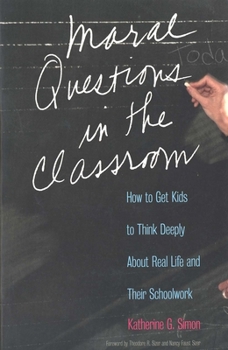Moral Questions in the Classroom: How to Get Kids to Think Deeply about Real Life and Their Schoolwork
Select Format
Select Condition 
Book Overview
What constitutes a just war? How does race matter in America? Are the interests of corporations the same as those of the public when it comes to the environment or public health? Middle and high school history, literature, and science classes abound with important moral, social, and political questions. But under pressure to cover required materials and out of fear of raising controversy, teachers often avoid classroom discussions of questions of...
Format:Paperback
Language:English
ISBN:0300101686
ISBN13:9780300101683
Release Date:September 2003
Publisher:Yale University Press
Length:304 Pages
Weight:1.15 lbs.
Dimensions:0.8" x 6.1" x 9.3"
Customer Reviews
3 ratings
A "must read" for teachers
Published by Thriftbooks.com User , 20 years ago
I read Katherine Simon's book "Moral Questions in the Classroom" this summer with much interest and excitement. It seemed like such a great resource that I decided to introduce parts to my college students in our teacher education program and make a quick change in my syllabus. She includes examples of the missed and avoided opportunities for moral conversations, transcripts and explanations of several in-depth discussions of moral and existential discussions, and very cogent and sharp yet sympathetic analysis. These all impressed me deeply, and I look forward to the reactions of my students. I really think that every teacher, especially those in middle and high schools, should read and discuss this book. It would make a great book for teacher discussion groups, for teacher education classes, and for graduate programs in education.
Thinking deeply about moral and existential questions...
Published by Thriftbooks.com User , 20 years ago
Six years after she completed her fieldwork in three high schools (one typically suburban, one Catholic, and one Jewish), Katherine Simon has written this book about discussing moral issues in the classroom. Her emphasis is on the interaction between the kids and teachers around what she calls "moral and existential" questions--what is a good life, what does it mean to die, what matters? She loves how youngsters can "open up" their seriously held questions of meaning of their lives under proper classroom management and curriculum design. She thinks that these questions are the heart of good education. Her intellectual foundations seem to be Ted and Nancy Sizer and the Coalition of Essential Schools forum at Brown University--and the urging to ask important questions of youngsters.Simon believes that most modern schools disconnect kids from their important questions and focus wrongly on the "trivial" non-essential mechanical mass tests at the end of the year. To this extent, she shares the liberal bias that objectivity and accountability are chimerical. Simon also differentiates her approach from cognitive developmentalists (Kohlberg, Nodding, Gilligan), character educators (Wynne, Lickona, Ryan, Bennett), and the values clarification crowd (who get caught in moral relativism). Instead, Simon is a "pure" educator: she believes that all good education, including moral education, has coherence, is honest, allows for critical reflection, raises questions about how humans should act, and explores questions into the unknown.What I liked most from this book: Simon gives detailed transcripts and stories from the three schools that served as her fieldwork. These transcripts are about raising moral questions as part of the curriculum: e.g., in literature (War and Peace) or biology class. I also agree with her pet peeve--that of missed opportunities to discuss moral and existential issues with kids.I found all of the book easy to understand, but I am saddened that this book really falls into the genre of idealistic "systemic reform" books--that is, those books by thoughtful writers who are fed up with the limits of American public schools, which educate few children well. I believe that it would take thousands of Katherine Simons to implement moral discussions in classrooms--but perhaps some individual teachers will read this book and take heart.
Someone is finally asking the right questions
Published by Thriftbooks.com User , 22 years ago
Thank you to Katherine Simon for suggesting ways that education can be meaningful both for students and teachers. This beautifully written and well argued book argues that teachers are systemically limited in their ability to ask meaningful questions, the ones that students most want to talk about and teachers most want to teach. "Moral" or "existential" questions are what liberal education should be about, Simon argues, and this university professor frankly agrees.Finally, an academic and educator is forcing us to ask what price we are paying by making standardized tests the measure of learning, and she charts a path for bringing meaning back into education. This book is a MUST READ for anyone interested in children's education.I plan on asking my university colleagues to read it, because although Simon focuses on K-12 education, her lessons are applicable to all levels of learning.Kudos to Dr. Simon






